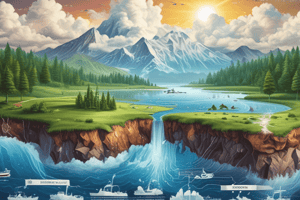Podcast
Questions and Answers
Which of the following options refers to an element that needs air to live?
Which of the following options refers to an element that needs air to live?
- Water
- Fish
- Tree (correct)
- Rock
Ice is a gas.
Ice is a gas.
False (B)
What state of matter is water when it is vapor?
What state of matter is water when it is vapor?
gas
______________ is a liquid.
______________ is a liquid.
Match the states of water with their corresponding forms:
Match the states of water with their corresponding forms:
Which state of water exists when it is in a form that does not flow and has a fixed shape?
Which state of water exists when it is in a form that does not flow and has a fixed shape?
Which type of water is found in rivers and streams?
Which type of water is found in rivers and streams?
What needs air in order to survive?
What needs air in order to survive?
Which of the following is the gas form of water?
Which of the following is the gas form of water?
In the water cycle, which phase involves water turning into vapor?
In the water cycle, which phase involves water turning into vapor?
Flashcards
States of Matter
States of Matter
Matter exists in three forms: solid, liquid, and gas.
Solid
Solid
Has a fixed shape and volume, particles are tightly packed.
Liquid
Liquid
Has a fixed volume but takes the container's shape, particles are less tightly packed than in solids.
Gas
Gas
Signup and view all the flashcards
Water Cycle
Water Cycle
Signup and view all the flashcards
Evaporation
Evaporation
Signup and view all the flashcards
Condensation
Condensation
Signup and view all the flashcards
Air's Role for Living Things
Air's Role for Living Things
Signup and view all the flashcards
Saltwater
Saltwater
Signup and view all the flashcards
Freshwater
Freshwater
Signup and view all the flashcards
Study Notes
States of Matter
- Matter exists in three primary states: solid, liquid, and gas.
- Solid: Has a definite shape and volume, particles are closely packed together.
- Liquid: Has a definite volume but takes the shape of its container, particles are less tightly packed than in solids.
- Gas: Has neither a definite shape nor volume, particles are far apart and move freely.
Living Organisms and Air
- All living organisms, such as humans, animals, and many plants, require air (specifically oxygen) to survive.
- Air is essential for processes like respiration, which provides energy for growth and sustenance.
Water Cycle
- The water cycle describes the continuous movement of water within the Earth and atmosphere.
- Key processes include:
- Evaporation: Water changes from liquid to vapor.
- Condensation: Water vapor cools and forms clouds.
- Precipitation: Water falls to Earth in the form of rain, snow, sleet, or hail.
- Collection: Water gathers in bodies of water, returning to lakes, rivers, and oceans.
Phases of Water
- Water vapour is a gas, not visible and exists in the air.
- Water is a liquid, commonly found in lakes, oceans, and rivers.
- Ice is a solid, formed when water freezes at 0 degrees Celsius (32 degrees Fahrenheit).
States of Matter
- Matter exists in three primary states: solid, liquid, and gas.
- Solids have a definite shape and volume, molecules are closely packed.
- Liquids have a definite volume but take the shape of their container, molecules are less tightly packed.
- Gases have neither a definite shape nor volume, molecules are widely spaced and move freely.
Need for Air
- Many living organisms, including humans and animals, require air to survive.
- Air contains oxygen, essential for respiration in aerobic organisms.
Water Cycle
- The water cycle is a continuous process of water movement through the environment.
- Key components include evaporation, condensation, precipitation, and collection.
- Water evaporates from surfaces, condenses into clouds, precipitates as rain or snow, and collects in bodies of water.
Properties of Water
- Water exists in three states: gas (water vapor), liquid (water), and solid (ice).
- Water vapor is the gaseous state of water.
- Water is the liquid state, essential for life.
- Ice is the solid state of water, formed when temperatures are low enough.
Types of Water
- Saltwater is found in oceans and seas, containing a significant amount of dissolved salt.
- Freshwater refers to water with low concentrations of salt, found in streams, rivers, and lakes.
- The sea has saltwater, while the ocean also contains saltwater.
- Streams and rivers typically have freshwater.
Studying That Suits You
Use AI to generate personalized quizzes and flashcards to suit your learning preferences.




